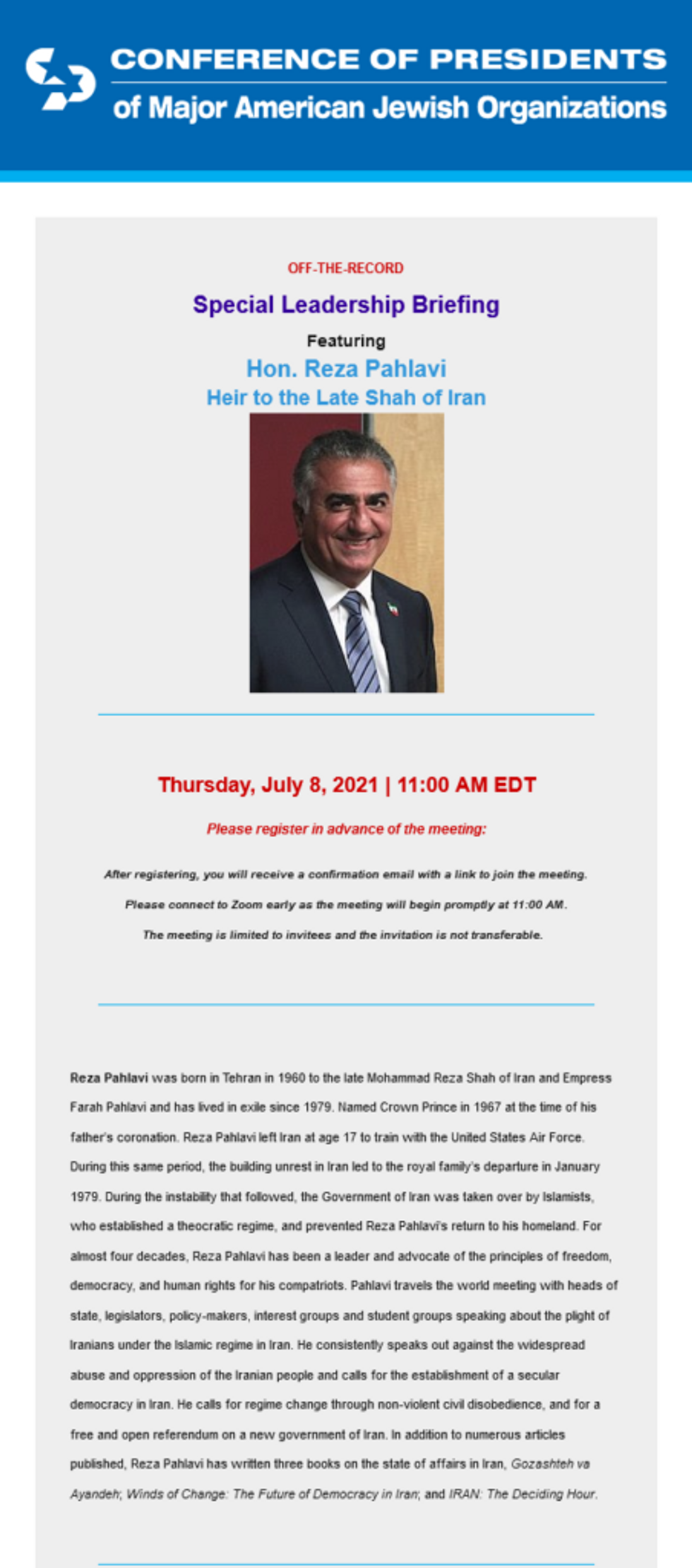The Conference of Presidents of Major American Jewish Organizations, an umbrella group representing various Jewish American and pro-Israel organizations, is planning to host Reza Pahlavi, the heir apparent to the last Shah of Iran, for an off-the-record “special leadership briefing” on Thursday, bringing questions and condemnations from other pro-Israel and Iranian American groups.
An invitation sent to member organizations and obtained by Responsible Statecraft describes Pahlavi as “a leader and advocate of the principles of freedom, democracy, and human rights for his compatriots” and “call[ing] for regime change through non-violent civil disobedience, and for a free and open referendum on a new government of Iran.”
“Appearing to rally around the reinstating of a repressive non-democratic regime is not a great look for Jewish American leaders,” Foundation for Middle East Peace president Lara Friedman told Responsible Statecraft.
Indeed, Pahlavi’s often well-grounded criticisms of the current Iranian government’s human rights record notably omits any acknowledgement that his father’s rule, which the younger Pahlavi portrays in glowing terms, engaged in brutal repression, lack of political freedoms, and torture.
That whitewashing of the Shah’s rule was amplified during the Trump administration, with the State Department extolling Iran’s “rich history of human rights from the time of Cyrus up until the 1979 revolution.”
The Conference’s role in supporting the Trump administration’s abrogation of the Joint Comprehensive Plan of Action with Iran, an agreement that put restraints on Iran’s nuclear program in exhange for sanctions relief, was highlighted by a senior official at a pro-Israel organization that is not a member of the Conference.
"The Conference of Presidents stood against both the consensus of the Israeli security establishment and nearly three-quarters of Jewish US voters when it applauded Donald Trump's violation and abandonment of the anti-nuclear agreement with Iran,” said the official. “If it has time to meet with the figurehead of a long-deposed monarchy, it should also make the time to meet with some of the overwhelming number of nonproliferation and defense experts, Iranian human rights activists and representatives of the American Jewish community who support re-entry to the agreement."

Pahlavi’s support of regime change, raised concerns for at least one Conference member.
When asked if Pahlavi’s calls for regime change were problematic, Hadar Susskind, the president of Americans for Peace Now, a Conference member, responded, "although it’s not clear that the Conference is in fact doing so by inviting him, I think it would be very problematic for an organization that puts itself forward as the voice of the Jewish community to be seen as calling for regime change."
Jamal Abdi, president of the National Iranian American Council, went further, calling out the Council of Presidents for the role its members, which include the pro-Israel and anti-Iran nuclear deal powerhouse American Israel Public Affairs Committee, play in fueling tensions between the United States and Iran.
"[Members of the Conference of Presidents] advocate for crippling sanctions that starve Iranians and exacerbated the spread of Covid in Iran, and worked to unravel the diplomatic accord that ordinary Iranians celebrated as the brightest hope for peace and prosperity," Abdi said. “Instead of standing up external opposition figures willing to put a ‘native’ face on regime change efforts, [the Conference of Presidents] should promote diplomacy and the reduction of external tensions to cultivate the circumstances that historically have enabled populations to organize organically and decide their own political destiny in the face of authoritarian regimes.”
Indeed, it is unclear what, if any, relevant experience or expertise Pahlavi has acquired since his family’s exile from Iran when he was 19 years old that would qualify him as the regime change leader the Conference’s invitation describes.
A 2009 analysis by the Brookings Institution observed that Pahlavi lacks an organized following within Iran, later adding, “[Iranian opposition figures], like Pahlavi, have little in common with the intellectuals and students who make up the core of the reform movement.”
Indeed, Pahlavi’s lack of legitimacy within Iran and “no serious monarchist movement in Iran itself,” according to Brookings, poses more questions than answers about why the Conference of Presidents is holding a closed doors briefing with the last heir apparent to the Imperial State of Iran.
The Conference of Presidents did not respond to questions about why Pahlavi was invited to address the group and whether the conference supports regime change in Iran.
Pahlavi, for his part, has been open about his agenda and strategy, telling the Associated Press in 2017, “My focus right now is on liberating Iran, and I will find any means that I can, without compromising the national interests and independence, with anyone who is willing to give us a hand, whether it is the U.S. or the Saudis or the Israelis or whomever it is.”
















